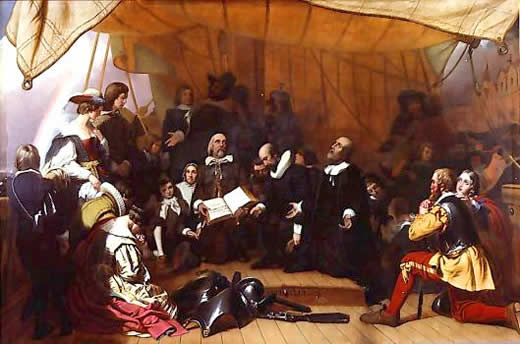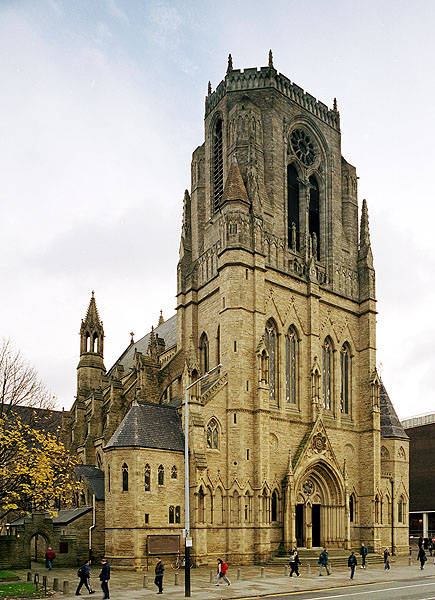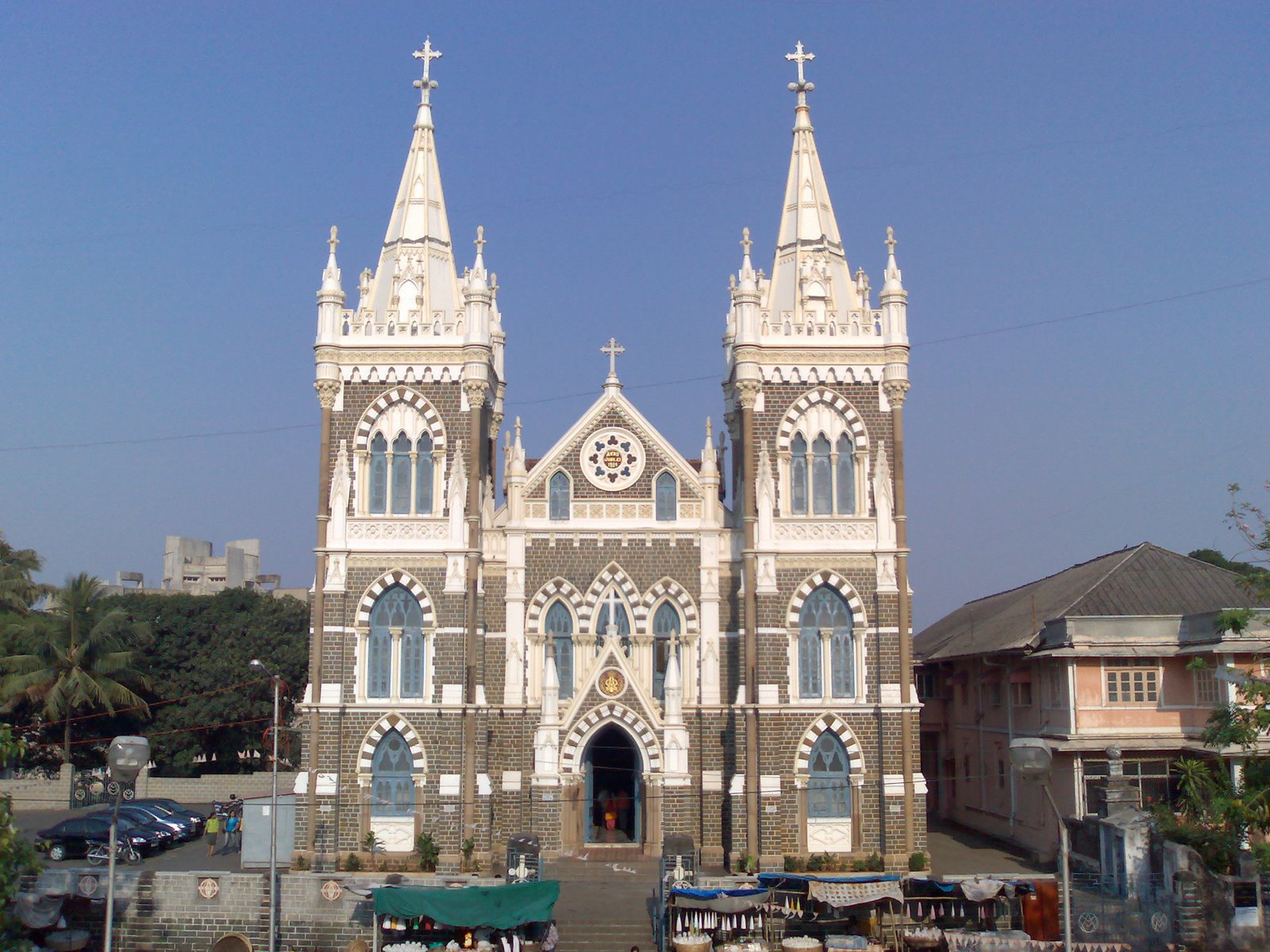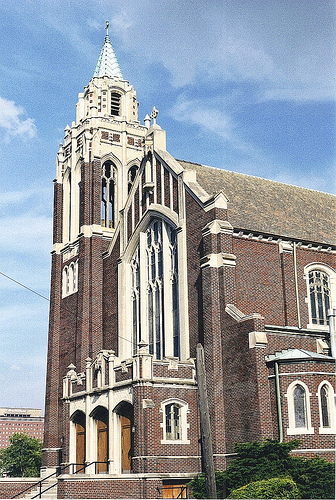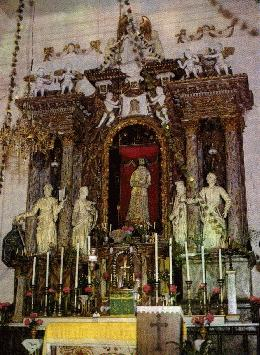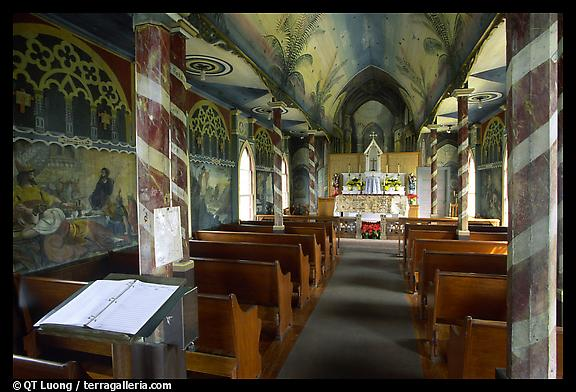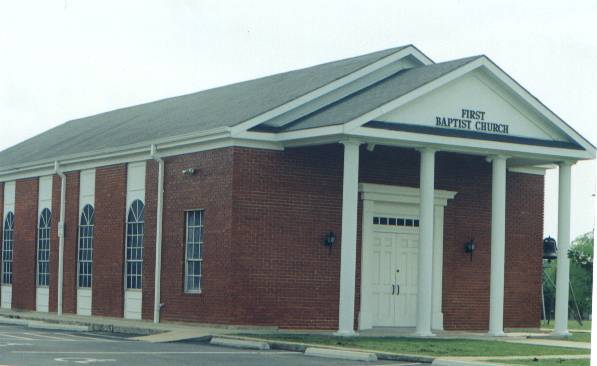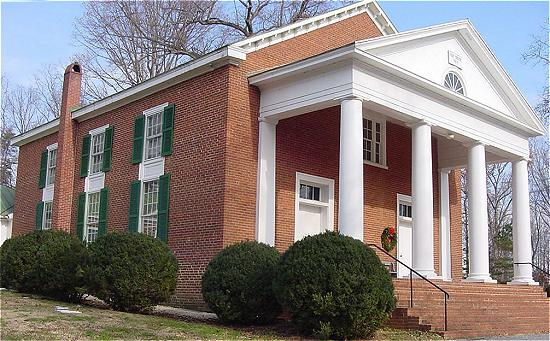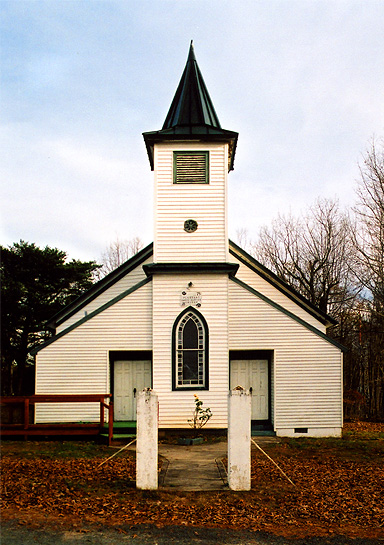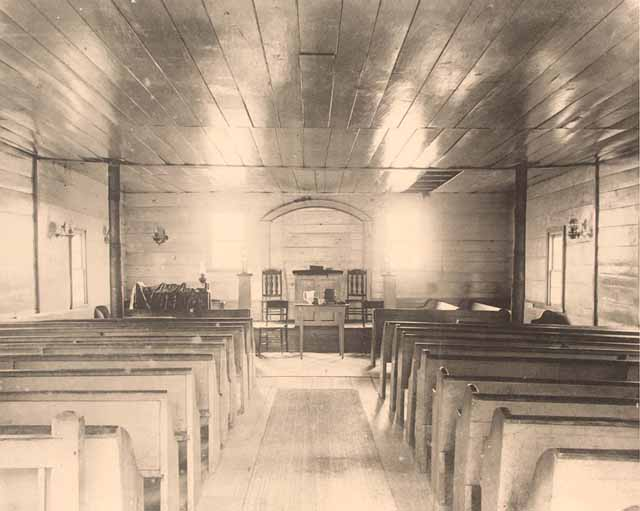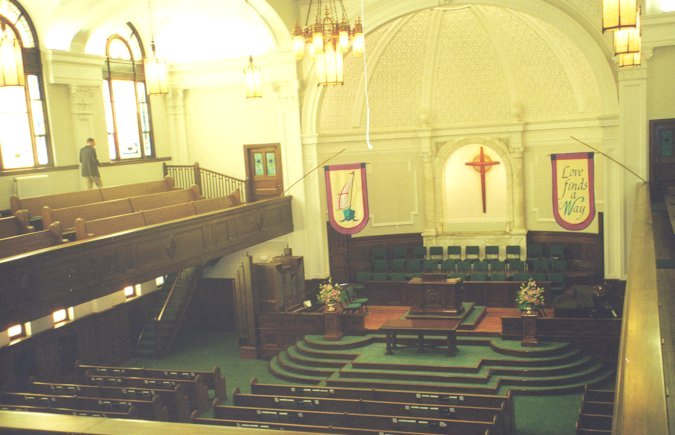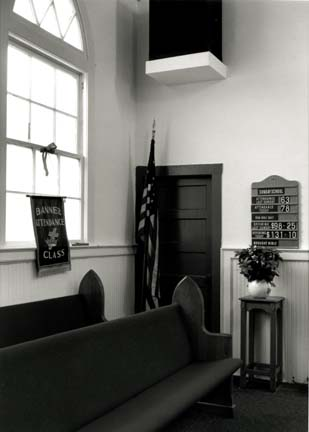
Online Texts for Craig White's Literature Courses
|
Of Plymouth Plantation
Chapter 1. Bradford’s history of the Protestant Reformation in England
|
|
Bradford's Of Plymouth Plantation
And first of the occasion and inducements thereunto; the which, that I may truly unfold, I must begin at the very root and rise of the same. The which I shall endeavor to manifest in a plain style, with singular regard unto the simple truth in all things; at least as near as my slender judgment can attain the same.
Chapter 1. Bradford’s history of the Protestant Reformation in England
[chapter 1, paragraph 1 > ¶1.1] It is well known unto the godly and judicious, how, ever since the first breaking out of the light of the gospel [Protestantism] in our Honorable Nation of England, (which was the first of nations whom the Lord adorned therewith, after that gross darkness of popery [Catholicism] which had covered and overspread the Christian world,) what wars and oppositions ever since, Satan hath raised, maintained, and continued against the Saints, from time to time, in one sort or other. Sometimes by bloody death and cruel torments; other [times Satan inflicted] imprisonments, banishments, and other hard usages; as being loath his [Satan’s] kingdom should go down, the truth prevail, and the churches of God revert to their ancient purity, and recover their primitive order, liberty, and beauty. [Protestantism recovers the original idea of the church like Christ’s Apostles practiced in the Book of Acts; by implicit contrast, the Catholicism adds to the history of the church--which, according to the Protestants, would lead them away from the light of divine revelation in the gospel and into the darkness of human sin.]
[¶1.2] But when he [Satan] could not prevail by these means, against the main truths of the gospel, but that they [truths] began to take root in many places, being watered with the blood of the martyrs, and blessed from heaven with a gracious increase; he then began to take him to his ancient stratagems, used of old against the first Christians [<again Bradford compares early Protestants to the original church]. That when by the bloody and barbarous persecutions of the Heathen Emperors, he [Satan] could not stop and subvert the course of the gospel, but that it speedily overspread with a wonderful celerity [speed] the then best known parts of the world, He [Satan] then began to sow errors, heresies, and wonderful dissensions amongst the professors [be;oevers] themselves, (working upon their pride and ambition, with other corrupt passions incidental to all mortal men, yea to the saints themselves in some measure,) by which woeful effects followed; as not only bitter contentions, and heartburnings, schisms, with other horrible confusions, but Satan took occasion and advantage thereby to foist in a number of vile ceremonies, with many unprofitable canons [laws] and decrees, which have since been as snares [traps] to many poor and peaceable souls even to this day.
[Paragraph 1.2 above is a popular Protestant accusation against Catholicism: that over time it was corrupted; instead of the simple, plain worship of the early Apostolic church, the Catholic church increasingly substituted “ceremonies” or liturgy. Even today, evangelical Protestant churches may be characterized as “non-liturgical,” or lacking elaborate orders of worship.]
[¶1.3] So as in the ancient times, the persecutions by the heathen and their Emperors, was not greater then of the Christians one against other; the Arians [heretics] and other their accomplices against the orthodox and true Christians [Protestants]. As witnesseth Socrates in his 2nd book. [Socrates Scholasticus, Greek historian of 5th c. AD], His words are these:
The violence truly (saith he) was no less than that of old practiced towards the Christians when they were compelled and drawe to sacrifice to idols; for many endured sundry [various] kinds of torment, often rackings [torture by the rack], and dismembering of their joints; confiscating of their goods; some bereaved of their native soil [banished]; others departed this life under the hands of the tormentor; and some died in banishment, and never saw their country again, etc.
[¶1.4] The like method Satan hath seemed to hold in these later times, since the truth began to spring and spread after the great defection made by Antichrist, that man of sin.
[¶1.5] For to let pass the infinite examples in sundry [various] nations and several places of the world, and instance [find examples] in our own, when as that old serpent could not prevail by those fiery flames and other of his cruel tragedies, which he by his instruments put in ure [practice] everywhere in the days of Queen Mary [Catholic monarch in England] and before, he then began another kind of war, and went more closely to work; 'not only to oppugn [ ] but even to ruin and destroy the kingdom of Christ, by more secret and subtle means, by kindling the flames of contention and sowing the seeds of discord and bitter enmity amongst the professors and seeming reformed themselves. For when he could not prevail by the former means [contention] against the principal doctrines of faith, he bent his force against the holy discipline and outward regiment [ ] of the kingdom of Christ, by which those holy doctrines should be conserved, and true piety maintained among the saints and people of God.
[¶1.6] Mr. Foxe [John Fox, The Book of Martyrs] records how that besides those worthy martyrs and confessors which were burned in Queen Mary’s days and otherwise tormented,
many (both students and others) fled out of the land, to the number of 800. And became several congregations [local “congregations,” not a universal or international church, as basis of Pilgrim-Puritan organization] at Wesel, Frankfort, Basel, Emden, Markpurge, Strasburg, and Geneva, etc.
Amongst whom (but especially those at Frankfort) began that bitter war of contention and persecution about the ceremonies [liturgy], and service book [the English Book of Common Prayer], and other popish and antichristian stuff, the plague of England to this day, which are like the high places in Israel, which the prophets cried out against, and were their ruin; which the better part sought, according to the purity of the gospel, to root out and utterly to abandon. And the other part (under veiled pretences) for their own ends and advancements, sought as stiffly to continue, maintain, and defend. As appears by the discord thereof published in print, Anno 1575; a book that deserves better to be known and considered.
[In the paragraphs above & below, Bradford relocates the Catholic-Protestant split to English Protestantism: The Church of England (a. k. a. Anglicans, Episcopalians) is associated with “popish” ceremonies while more radical Protestant Separatists like the Pilgrims and Puritans are associated with the simplicity, plain style, and “purity of the gospel.”]
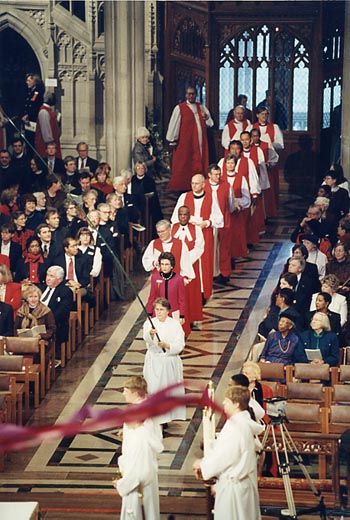
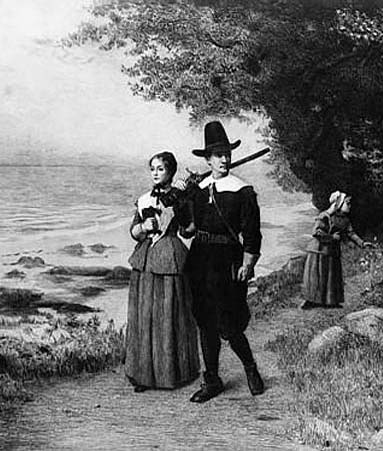
The contrast in Anglican and Puritan styles of worship can be reflected in their visual styles.
[¶1.7] The one side labored to have the right worship of God and discipline of
Christ established in the church, according to the simplicity of the gospel,
without the mixture of men’s inventions, and to have and to be ruled by the laws
of God’s word, [another expression of the Protestant-Catholic difference: that
Catholic-Episcopal worship was corrupted by the long history of the church,
while the new Protestant churches re-formed the original church according to
divine revelation in the scriptures] dispensed in those offices, and by
those officers of Pastors, Teachers, and Elders, etc. according to the
Scriptures. The other party [the Church of England], though under many colors
and pretences, endeavored to have the Episcopal
[Episcopal = bishop-ruled] dignity (after the popish
[Catholic]
manner) with their large power and jurisdiction still retained; with all
those courts, canons [laws],
and ceremonies; together with all such livings, revenues, and subordinate
officers, with other such means as formerly upheld their antichristian
greatness, and enabled them with lordly and tyrannous power to persecute the
poor servants of God. This contention was so great, as neither the honor of God,
the common persecution, nor the mediation of Mr. Calvin
[John Calvin, 1509-1564, Protestant leader]
and other worthies of the Lord in those places, could prevail with those thus
Episcopally minded, but they proceeded by all means to disturb the peace of this
poor persecuted church [the radical Protestants
of England including those who became the Pilgrims], even so far as to
charge (very unjustly, and ungodlily, yet prelatelike
[i.e., with the high-handed authority of a
bishop]) some of their chief opposers, with rebellion and high treason
against the Emperor, and other such crimes. [Typology:
Describing the English monarch as an “Emperor” relates the English power
structure to that of secular Rome and, by extension, the Protestants to the
early church that Roman emperors persecuted.]
Catholic churches & interiors
|
|
|
|
|
|
|
|
|
Protestant churches & interiors
|
|
|
|
|
|
|
|
|
[¶1.8a] And this contention died not with Queen Mary [a.k.a. Mary, Queen of Scots], nor was left beyond the seas [many English Protestants went overseas to other European countries during Catholic Queen Mary’s reign, 1553-58], but at her death these people returning into England under gracious Queen Elizabeth [Queen Elizabeth I, 1533-1603, Mary’s half-sister], many of them being preferred to bishoprics and other promotions, according to-their aims and desires, that inveterate hatred against the holy discipline of Christ in his church hath continued to this day. Insomuch that for fear it should prevail, all plots and devices have been used to keep it out, incensing the queen and state against it as dangerous for the commonwealth; and that it was most needful that the fundamental points of Religion should be preached in those ignorant and superstitious times; and to win the weak and ignorant, they might retain diverse harmless ceremonies; and though it were to be wished that diverse things were reformed, yet this was not a season for it. [An interesting concession regarding the Protestant emphasis on literacy: The radical Protestants’ opponents argued that common, “ignorant” people needed ceremonies or liturgy to lead them in worship, rather than a Word-based worship.]
[¶1.8b] And many the like, to stop the mouths of the more godly, to bring them over to yield to one ceremony after another, and one corruption after another; by these wiles [tricks] beguiling some and corrupting others till at length they began to persecute all the zealous professors [believers] in the land (though they knew little what this discipline meant) both by word and deed, if they would not submit to their ceremonies, and become slaves to them and their popish trash, which have no ground in the word of God, but are relics of that man of sin [Antichrist]. And the more the light of the gospel grew, the more they urged their subscriptions to these corruptions. So as (notwithstanding all their former pretences and fair colors), they whose eyes God had not justly blinded might easily see whereto these things tended. [that is, the Separatists saw they were losing the political battle for their religious style’s dominance] And to cast contempt the more upon the sincere servants of God, they [the party of the Church of England] opprobriously [condemningly] and most injuriously gave unto, and imposed upon them [the Separatists], that name of Puritans, which [it] is said the Novatians out of pride did assume and take unto themselves. [The Novations, a 3rd-century sect, were called Puritans and opposed the Roman Catholic church on similar grounds as later Protestants.] And lamentable [sad] it is to see the effects which have followed. Religion hath been disgraced, the godly grieved, afflicted, persecuted, and many exiled, sundry [various] have lost their lives in prisons and other ways. On the other hand, sin hath been countenanced, ignorance, profaneness, and atheism increased, and the papists encouraged to hope again for a day. [The Catholic-leaning Anglicans have prevailed to the extant that Protestantism in England may be threatened.]
[¶1.9a] This made that holy man Mr. Perkins [William Perkins, 1558-1603, English Puritan religious leader] cry out in his exhortation to repentance, upon Zephaniah 2.
Religion (says he) hath been amongst us this 35 years; but the more it is published, the more it is contemned [scorned] and reproached of many, etc. Thus not profaneness nor wickedness, but Religion it self is a byword, a mocking-stock, and a matter of reproach ; so that in England at this day the man or woman that begins to profess Religion, and to serve God, must resolve with himself to sustain mocks and injuries even as though he lived amongst the enemies of Religion.
And this, common experience hath confirmed and made too apparent.
[¶1.9b] * A late observation, as it were by the way, worthy to be Noted: Full little did I think, that the downfall of the Bishops, with their courts, canons [laws], and ceremonies, etc. had been so near, when I first began these scribbled writings (which was about the year 1630, and so pieced up at times of leisure afterward), or that I should have lived to have seen or heard of the same; but it is the Lord's doing, and ought to be marvelous in our eyes! Every plant which mine heavenly father hath not planted (saith our Savior) shall be uprooted. Matthew 15. 13. I have snared thee, and thou art taken, O Babel (Bishops), and thou wast not aware; thou art found, and also caught, because thou hast striven against the Lord. Jeremiah 50.
[¶1.9c] But will they [the Episcopal Bishops] needs strive against the truth, against the servants of God; what, and against the Lord himself? Do they provoke the Lord to anger? Are they stronger than he? 1 Cor. 10. 22. No, no, they have met with their match. Behold, I come unto thee, O proud man, saith the Lord God of hosts; for thy day is come, even the time that I will visit thee. Jer. 50. 31. May not the people of God now say (and these poor people among the rest), The Lord hath brought forth our righteousness; come, let us declare in Zion the work of the Lord our God. Jer. 51. 10. Let all flesh be still before the Lord; for he is raised up out of his holy place. Zach : 2. In this case, these poor people may say (among the thousands of Israel), When the Lord brought again the captivity of Zion, we were like them that dream. Psalms 126.1. The Lord hath done great things for us, whereof we rejoice. v. 3. They that sow in tears, shall reap in joy. They went weeping, and carried precious seed, but they shall return with joy, and bring their sheaves. v. 5, 6.
[Typology: In the paragraphs above and below, Bradford relates the Pilgrim-Puritans to the Old Testament God’s Chosen People the Israelites. “Zion,” a Biblical term for the Promised Land, may correspond to America.]
[¶1.9d] Do you not now see the fruits of your labors, O all ye servants of the Lord that have suffered for his truth, and have been faithful witnesses of the same, and ye little handful amongst the rest, the least among the thousands of Israel? You have not only had a seed time, but many of you have seen the joyful harvest; should you not then rejoice, yea, and again rejoice, and say Hallelujah, salvation, and glory, and honour, and power, be to the Lord our God; for true and righteous are his judgments. Rev. 19.1, 2. But thou wilt ask, What is the matter? What is done? Why, art thou a stranger in Israel, that thou should not know what is done? Are not these Jebusites [Typology: the Jesubites were a Canaanite people who held Jerusalem before the Jews’ Exodus—comparable to the Indians of North America for the Pilgrims] overcome that have vexed the people of Israel so long, even holding Jerusalem till David’s days, and been as thorns in their sides, so many ages; and now began to scorn that any David should meddle with them; they began to fortify their tower, as that of the old Babylonians; but these proud Anakims [Typology: also a Canaanite tribe in what would become Israel] are thrown down, and their glory laid in the dust.
[¶1.9e] The tyrannous bishops are
ejected, their courts dissolved, their canons forceless, their service cashiered
[terminated], their ceremonies useless and despised; their plots for
popery prevented, and all their superstitions discarded and returned to Rome
from whence they came, and the monuments of idolatry rooted out of the land.
[The “plain style” of the Puritans partly results from the biblical Jews’
embrace of an “invisible God” that could not be represented by an idol.] And the
proud and profane supporters, and cruel defenders of these (as bloody papists
and wicked atheists, and their malignant consorts) marvelously overthrown. And
are not these great things ? Who can deny it? But who hath done it? Who, even he
that sitteth on the white horse, who is called faithful, and true, and judgeth
and fighteth righteously, Rev. 19.11 whose garments are dipped in blood, and his
name was called the word of God, verse13. for he shall rule them with a rod of
iron; for it is he that treadeth the winepress of the fierceness and wrath of
God almighty. And he hath upon his garment, and upon his thigh, a name written,
The King of Kings, and Lord of Lords. v. 15, 16. Hallelujah!
[¶1.10a] But that I may come more near my intention; when as by the travail
[labor] and diligence of some godly and zealous preachers, and God’s blessing on
their labors, as in other places of the land, so in the North parts
[of England, where Separatism prevailed, in
contrast to national power centers such as London in England’s South],
many became enlightened by the word of God, and had their ignorance and sins
discovered unto them, and began by his [God’s] grace to reform their lives, and
make conscience of their ways, the work of God was no sooner manifest in them,
but presently they were both scoffed and scorned by the profane multitude, and
the ministers urged with the yoke of subscription
[conformity to Church of England],
or else must be silenced; and the poor people were so vexed with apparitors, and
pursuivants [church court officers] and
the commissary courts [judging marriage, inheritance, legitimacy], as truly
their affliction was not small; which, notwithstanding, they bore sundry years
with much patience, till they were occasioned (by the continuance and increase
of these troubles, and other means which the Lord raised up in those days) to
see further into things by the light of the word of God.
[¶1.10b] How not only these base and beggarly ceremonies were unlawful, but also that the lordly and tyrannous power of the prelates [bishops] ought not to be submitted unto; which thus, contrary to the freedom of the gospel, would load and burden men’s consciences, and by their compulsive power make a profane mixture of persons and things in the worship of God. And that their offices and callings, courts and canons, etc. were unlawfull and antichristian; being such as have no warrant in the word of God; but the same that were used in popery, and still retained. [Again the Separatist Protestants reject religious laws not based on written scripture; such an anti-legalistic attitude as well as “the freedom of the gospel” would influence American attitudes toward limited government and separation of church and state.]
[¶1.10c] Of which a famous author thus writes in his Dutch commentaries, at the coming of King James into England:
The new king (says he) found there established the reformed religion, according to the reformed religion of King Edward the VI [son of Henry VIII, who led the English Reformation], retaining or keeping still the spiritual state of the Bishops, etc. after the old manner, much varying and differing from the reformed churches in Scotland, France, and the Netherlands, Emden, Geneva, etc. whose reformation is cut, or shapen much nearer the first Christian churches, as it was used in the Apostles’ times.
So many therefore of these professors [believers] as saw the evil of these things, in these parts, and whose hearts the Lord had touched with heavenly zeal for his truth, they shook off this yoke of antichristian bondage, and as the Lord’s free people, joined themselves (by a covenant of the Lord) into a church estate [a congregation, the Puritans’ primary organization], in the fellowship of the gospel, to walk in all his ways, made known, or to be made known unto them, according to their best endeavors, whatsoever it should cost them, the Lord assisting them.
[¶1.10d] And that it cost them [the Separatists or Congregationalists] something this ensuing history will declare. These people became two distinct bodies or churches, and in regard of distance of place did congregate severally; for they were of sundry towns and villages, some in Nottinghamshire, some of Lincolnshire, and some of Yorkshire, where they border nearest together. [All towns of the “North parts” of England The town of Scrooby, whose church Bradford joined, was in Nottinghamshire.]
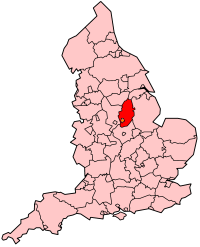
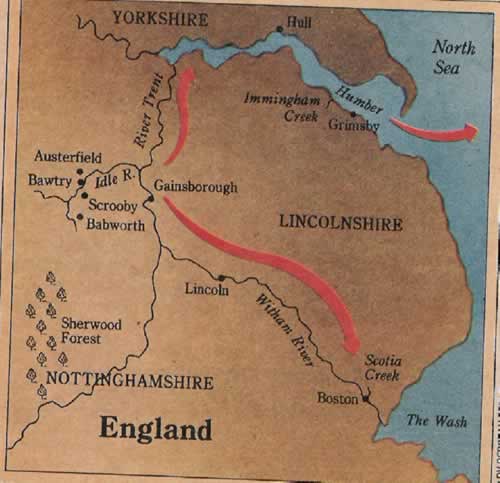
Maps showing parts of England from which the Pilgrims started.
[¶1.10e] In one of these churches (besides others of note) was Mr. John Smith, a man of able gifts, and a good preacher, who afterwards was chosen their pastor. But these afterwards falling into some errors in the Low Countries, there (for the most part) buried themselves, and their names. [Bradford here previews the Pilgrims’ initial journey to the Netherlands or “Low Countries”—see chapters 3 & 4.]
[¶1.10e] But in this other church (which must be the subject of our discourse) besides other worthy men, was Mr. Richard Clifton, a grave and reverend preacher, who by his paines and diligence had done much good, and under God had been a means of the conversion of many. And also that famous and worthy man Mr. John Robinson, who afterwards was their pastor for many years, till the Lord took him away by death. Also Mr. William Brewster, a reverent man, who afterwards was chosen an elder of the church and lived with them till old age.
[¶1.11a] But after these things [the Anglicans’ persecutions] they could not long continue in any peaceable condition, but were hunted and persecuted on every side, so as their former afflictions were but as flea-bitings in comparison of these which now carne upon them. For some were taken and clapped up in prison, others had their houses beset and watched night and day, and hardly escaped their [religious officers’] hands; and the most were fain [inclined] to fly [flee] and leave their houses and habitations, and the means of their livelihood. Yet these and many other sharper things which afterward befell them, were no other then they looked for, and therefore were they better prepared to bear them by the assistance of God’s grave and spirite.
[¶1.11b] Yet seeing themselves thus molested, and that there was no hope of their continuance there [in England], by a joint consent they resolved to go into the Low Countries [Holland or The Netherlands], where they heard was freedom of Religion for all men [Today the Netherlands likewise maintain a reputation as earth’s most liberal nation]; as also how sundry [others] from London, and other parts of the land, had been exiled and persecuted for the same cause, and were gone thither, and lived at Amsterdam, and in other places of the land. So after they had continued together about a year, and kept their meetings every Sabbath in one place or other, exercising the worship of God amongst themselves, notwithstanding all the diligence and malice of their adversaries, they seeing they could no longer continue in that condition, they resolved to get over into Holland as they could; which was in the year 1607 and 1608; of which more at large in the next chapter.
